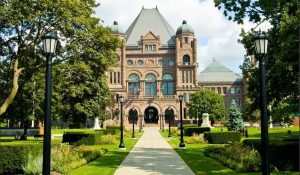Fiscal and Economic Update
Finance Minister Bill Morneau delivered his first fiscal and economic update following the 2019 federal election. The Government of Canada projects the federal deficit will be:
- $26.6 billion in 2019-20
- $28.1 billion in 2020-21
- $22.1 billion in 2021-22
- $18.4 billion in 2022-23
The federal government is also projecting a constant debt to GDP ratio of 30% for the four fiscal years.
Economic growth after inflation is projected to be around 1.6% in 2020.
Canada is also on track to be the second fastest growing economy in the G7 in 2020, only behind the United States.
Mandate Letters
Prime Minister Justin Trudeau also released the ministerial mandate letters for his new cabinet this week. Mandate letters outline the policy objectives as well as the pressing challenges ministers will address in their roles.
Mandate letters were first made public in November 2015 after Canadians elected Trudeau’s first government.
Here is the full set of 2019 Ministerial Mandate Letters:
- Deputy Prime Minister and Minister of Intergovernmental Affairs Mandate Letter
- Leader of the Government in the House of Commons Mandate Letter
- Minister for Women and Gender Equality and Rural Economic Development Mandate Letter
- Minister of Agriculture and Agri-Food Mandate Letter
- Minister of Canadian Heritage Mandate Letter
- Minister of Crown-Indigenous Relations Mandate Letter
- Minister of Digital Government Mandate Letter
- Minister of Diversity and Inclusion and Youth Mandate Letter
- Minister of Economic Development and Official Languages Mandate Letter
- Minister of Employment, Workforce Development and Disability Inclusion Mandate Letter
- Minister of Environment and Climate Change Mandate Letter
- Minister of Families, Children and Social Development Mandate Letter
- Minister of Finance Mandate Letter
- Minister of Fisheries, Oceans and the Canadian Coast Guard Mandate Letter
- Minister of Foreign Affairs Mandate Letter
- Minister of Health Mandate Letter
- Minister of Immigration, Refugees and Citizenship Mandate Letter
- Minister of Indigenous Services Mandate Letter
- Minister of Infrastructure and Communities Mandate Letter
- Minister of Innovation, Science and Industry Mandate Letter
- Minister of International Development Mandate Letter
- Minister of Justice and Attorney General of Canada Mandate Letter
- Minister of Labour Mandate Letter
- Minister of Middle Class Prosperity and Associate Minister of Finance Mandate Letter
- Minister of National Defence Mandate Letter
- Minister of National Revenue Mandate Letter
- Minister of Natural Resources Mandate Letter
OSPE is pleased to see that the Minister of Environment and Climate Change is tasked to:
- Implement the Pan-Canadian Framework on Clean Growth and Climate Change, while strengthening existing and introducing new greenhouse gas reducing measures to exceed Canada’s 2030 emissions reduction goal and beginning work so that Canada can achieve net-zero emissions by 2050.
- Lead government-wide efforts to develop a plan to set Canada on a path to achieve a prosperous net-zero emissions future by 2050. This includes:
- Setting legally-binding, five-year emissions-reduction milestones based on the advice of experts and consultations with Canadians; and
- Working with the Minister of Innovation, Science and Industry and the Minister of Natural Resources to position Canada as a global leader in clean technology.
- Work with the Minister of Natural Resources and provinces and territories to complete all flood maps in Canada.
OSPE also welcomes the mandate given to the Minister of Innovation, Science and Industry:
- Continue to support innovation ecosystems across the country, particularly those based on partnerships between businesses and post-secondary institutions, to support job creation, technology adoption, investment and scale-up.
- Continue to support Canada’s traditionally strong industries – including, but not limited to, automotive, aerospace and agri-food – to increase productivity and innovation, especially as we transition to a low-carbon economy. The ongoing work of the Economic Strategy Tables can guide your work in this regard.
- Support the Chief Science Advisor to ensure that the government’s pure and applied science is fully available to the public, that scientists are able to speak freely about their work and that scientific analysis from across Canada and around the world is considered when the Government makes decisions.
When it comes to Infrastructure, engineers are also pleased that the Minister of Infrastructure and Communities is tasked to ensuring funding is provided for transit projects, as well as green and natural infrastructure.
Some of the Ministerial priorities include:
- Require that all provinces and territories identify and approve all of their long-term infrastructure priorities within the next two years and according to the signed bilateral agreements. Funds that are not designated for specific approved projects by the end of 2021 will be reinvested directly in communities through a top up of the federal Gas Tax Fund.
- Create a National Infrastructure Fund to seek out and support major nation-building projects that will benefit people across various regions.
- Finalize the creation of an additional infrastructure fund by 2020-2021 to support priority projects and economic diversification for communities transitioning from fossil fuels.
- Make the federal commitment to fund public transit permanent and rise with the cost of construction over time. Ensure that new federal investments in public transit are used to support zero-emission buses and rail systems starting in 2023 and work with municipalities to address any exceptional circumstances.
- Work with provinces and territories to introduce new funding to help school boards and municipalities purchase 5,000 zero-emission school and transit buses over the next five years.
- Launch a new call for proposals under the Disaster Mitigation and Adaptation Fund to address the impacts of climate change, adjusting the program as required to ensure that the most impactful projects are supported, including those related to natural infrastructure, whether they are from small, rural and Indigenous communities or large urban centres.
OSPE looks forward to working with this new federal government to ensure engineering expertise and sound evidence-based policies are part of the decision making process.




